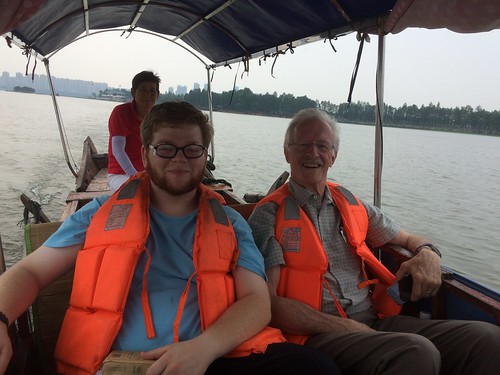By Joshua Sanders '18
 |
Throughout our time in the summer school program, each of the foreign students (two from Korea, three from Italy, and two other Americans plus myself) were assigned a volunteer who was a student at CTGU to help us and guide us. My volunteer, Jiang Nan, was incredible and was always happy to help us out or go out shopping, eating, or to KTV with us. She even helped me online shop for some gifts for others (and myself) online, and is shipping one to me that arrived after I’d left! All of the other volunteers were amazing as well, and at the closing ceremony before everybody left there were tears and hugs all around.
During the summer school, in addition to classes we went out on cultural outings, such as visits to the Three Gorges Dam (the world’s largest hydroelectric power facility), Zigui and Jiangxi for white water rafting (yes, white water rafting!), a tea factory to learn how to pick and process green tea, and a trip to a bijou factory. (Bijou is a traditional Chinese alcohol, the translation into English is “wine” however bijou is not wine, it is most certainly liquor… very strong liquor.) I have been and will continue sifting through all of the pictures I have to post some more to the Flickr album, but I took a lot of pictures and the volunteers took many as well and were kind enough to put them on a flash drive for me, so I’ve got hundreds of pictures and movies to go through.
My last night in China, I went out with several friends from the research lab I had worked in, and we ate dinner then went out singing KTV. Karaoke, which is “KTV” in China, is incredibly popular. In America, when someone says “karaoke” the mental image often conjured up is someone in a bar who got drunk and decided that karaoke was a good idea, but in China this isn’t the case at all. There are very nice KTV places with lots of individual rooms, and you and your friends can rent the room for a few hours. In the room, there’s often a disco ball or some laser lights, and a really nice tv set-up with a little tablet/display to pick songs to sing; KTV is comparable to making plans and going out bowling or to play mini-golf with friends.
Now that I’m back stateside (which almost didn’t happen on time because my flight from Yichang to Shanghai sat on the tarmac for two hours before take-off, yikes) I definitely want to stay for a while and finish my schooling but after I graduate from grad school (hopefully with a Ph.D) I definitely want to go back to Yichang and teach for a year at CTGU. I’ve spoken with some of the instructors at the school and with Dr. Johnson about it, and I’ve been told that it’s relatively certain that I’d be able to teach for a year, so that is definitely on my horizon. Until then, I’ll keep in touch with all of the friends I made in China and study hard so that I can graduate on time and get back to Yichang.
Thanks for reading and keeping up with all of my adventures in China, and more pics are on the way when I find the time to get through all of them! And again, I am incredibly thankful that I’m a Ferrum Panther, and that I’m in the Boone Honors Program. The professors, advisors, and everyone else in my Ferrum family help me be the student I am and do the amazing things I have been given chances to do. Without the support of my fellow Ferrum students and the professors and advisors I emailed and Skype called, I wouldn’t have made it through my time in China. It’s a great day to be a Panther.

